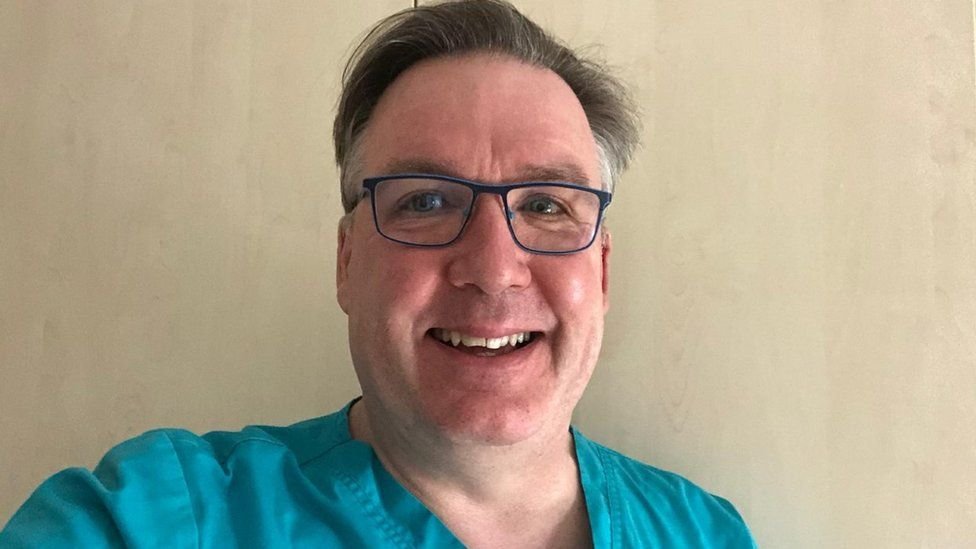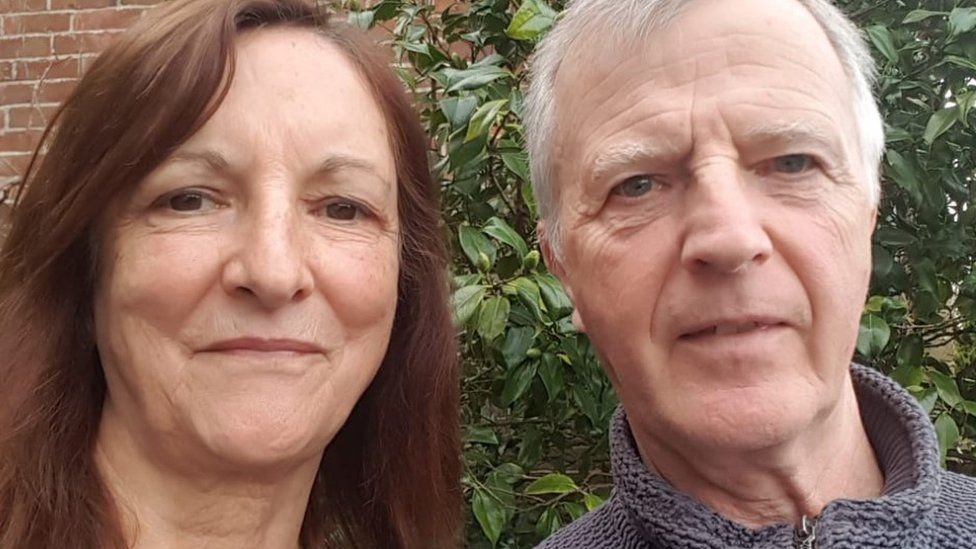When dentist Andy Bates offered to help administer the coronavirus vaccine, he hadn't bargained for the "overload of bureaucracy" he says came his way.
Dr Bates, from North Yorkshire, is one of a number of health staff to criticise the paperwork needed to gain NHS approval to give the jabs.
Some medics have been asked for proof they are trained in areas such as preventing radicalisation.
The NHS said training and checks were needed.
A spokesman for the NHS told the BBC: "Regardless of a person's background in healthcare, appropriate training and checks are necessary to handle the vaccine.
"[This] is why important processes are in place to make sure that former members of staff are up to speed on protocols and delivery, so that vaccinators are fully equipped with the skills to safely vaccinate patients in line with Public Health England standards."
The Pfizer-BioNTech vaccine was the first jab approved in the UK, and 944,539 people have had their first jab.
The Oxford-AstraZeneca vaccine has also been approved for use in the UK, with the first doses due to be given on Monday.

Dr Bates, a 56-year-old dentist based in Skipton, says he was met with layers of "bureaucracy" when he applied to be an NHS vaccinator - a role that requires healthcare experience.
He told BBC Radio's 5 live programme: "I am a working dentist with a dental practice. I work four days a week which gives me a day off and the weekend, so I thought I could probably help out [with] explaining things to people, being able to use a needle, being able to relax people in an environment where you're giving them a jab.
"It's part and parcel of the job of being a dentist."
But he says he and two of his dental staff who also applied for roles have been asked to upload a "huge list of documents" and complete online modules proving they are trained in certain areas to progress their applications.
The checklist to become an NHS vaccinator
Recognising and managing anaphylaxis
Resuscitation, level 2
Safeguarding adults, level 2
Safeguarding children, level 2
Vaccine administration
Vaccine storage
Health, Safety and Welfare, level 1
Infection Prevention and control, level 2
Introduction to Anaphylaxis
Legal aspects of vaccination
Moving and Handling, level 1
Preventing radicalisation, level 1
Conflict resolution, level 1
Core knowledge for Covid-19 vaccinators
Covid mRNA vaccine BNT162b2 (Pfizer BioNTech Covid-19 vaccine)
Data security awareness, level 1
Equality, Diversity and Human rights, level 1
Fire safety, level 1
Dr Bates says: "Some of the things are really quite sensible - like resuscitation, and recognising and managing anaphylaxis - but then you get things like preventing radicalisation, level 1 certificate required [or] safeguarding children level 2."
"Children aren't a priority for vaccination, [so] I really don't think we're going to be seeing children."
"To be a registered dentist and CQC registered dental practice, which you have to be, these are things that we have to prove to the CQC and declaring to the General Dental Council (GDC) every year that we have done and kept up to date various trainings."
But he said separating all these skills out according to the website's requirements "would be really quite a task" given his other work commitments.
"I must admit, I gave up at the second hurdle, because I'm very busy as a dentist and I do get home quite tired at night. I thought 'good grief, If I have to go through all this', I'm not [doing it]."
Dr Bates believes that registered healthcare practitioners should be able to apply through their registration details, with a thorough identity check that would fast-track them through the necessary training.

Dr Phil Clarke and wife Sheelagh, a nurse practitioner, retired from their local GP practice in Southampton two years ago. But when the pandemic struck in March and the government appealed for retired medics to help out, they answered the call and returned.
Sheelagh and Dr Clarke, both 67, say they have already been administering the Pfizer vaccine to the over-70s and 80s, care home residents and other vulnerable groups through their old practice.
But when the couple recently applied to become NHS vaccinators, Sheelagh says they feel that despite their skills and relevant experience, that the NHS was asking them to "jump through 101 hoops".
She told the BBC: "You kind of feel like you're trusted and have quite major responsibility to go in and do vaccinating, and then a very belittling application tells you that they don't trust that you've got the skills and abilities to do it."
She said although they had done a lot of the required e-learning for their own practice, some of the other modules they'd been asked to do had left them "flabbergasted".
"We don't have time to do any more e-learning, we've already done a lot - probably about 10-12 hours- some of which are perfectly reasonable, like infection control, it's the unreasonable demands" such as "awareness of radicalisation and conflict resolution".
Prof Martin Marshall, chair of the Royal College of GPs, said recently retired medics and other healthcare professionals have "huge amounts of skill and experience" to offer the vaccine effort and called for "bureaucratic barriers" to be kept to "the bare minimum".
He added: "Requiring people to submit more than 20 pieces of documentation, some of which have low relevance to the task they will be doing, and some of which some retired medics and returners to the profession won't even have, is a deterrent for them getting involved at a time when we need all hands on deck."
An NHS spokesman said "tens of thousands of people have already completed their online training" which "are being processed as quickly as possible and vaccinators will be deployed as and when they are required".
He added: "It is categorically untrue that there are any delays in Covid vaccination caused by accrediting volunteers or returners."
It comes as batches of the Oxford/AstraZeneca vaccine have started arriving at hospitals.
Some 530,000 doses of the jab will be available for rollout across the UK, with vulnerable groups already identified as the priority for immunisation.
The UK plans to accelerate its vaccination rollout, amid a rise in coronavirus cases driven by a new variant of coronavirus, by giving both parts of the Oxford and Pfizer vaccines 12 weeks apart, having initially planned to leave 21 days between the Pfizer jabs.
The UK's chief medical officers have defended the vaccination plan, after criticism from a doctors' union, insisting that getting more people vaccinated with the first jab "is much more preferable".
Public Health England (PHE) has clarified its guidance on second doses of the vaccine, after an article in the New York Times claimed there could be "mixing and matching" of the two different vaccines now authorised for use in the UK.
Dr Mary Ramsay, PHE's head of immunisations, said: "We do not recommend mixing the Covid-19 vaccines - if your first dose is the Pfizer vaccine you should not be given the AstraZeneca vaccine for your second dose and vice versa."
She added that on the "extremely rare occasions" where the same vaccine is unavailable or it is unknown which jab the patient received, it is "better to give a second dose of another vaccine than not at all".
However, the US government's top infectious diseases expert, Dr Anthony Fauci, has said he does not agree with the UK's plan to give more people a first dose of the Pfizer jab, while delaying second doses, adding that the US would not adopt a similar move.
But Prof Anthony Harnden, deputy chairman of the Joint Committee on Vaccination and Immunisation, defended the move.
He told BBC Radio 4's Today programme the vaccine "offers 90% protection for one dose" and that patients he had seen had accepted the decision, as the priority was "to get as many people vaccinated in the elderly and vulnerable community as possible".















